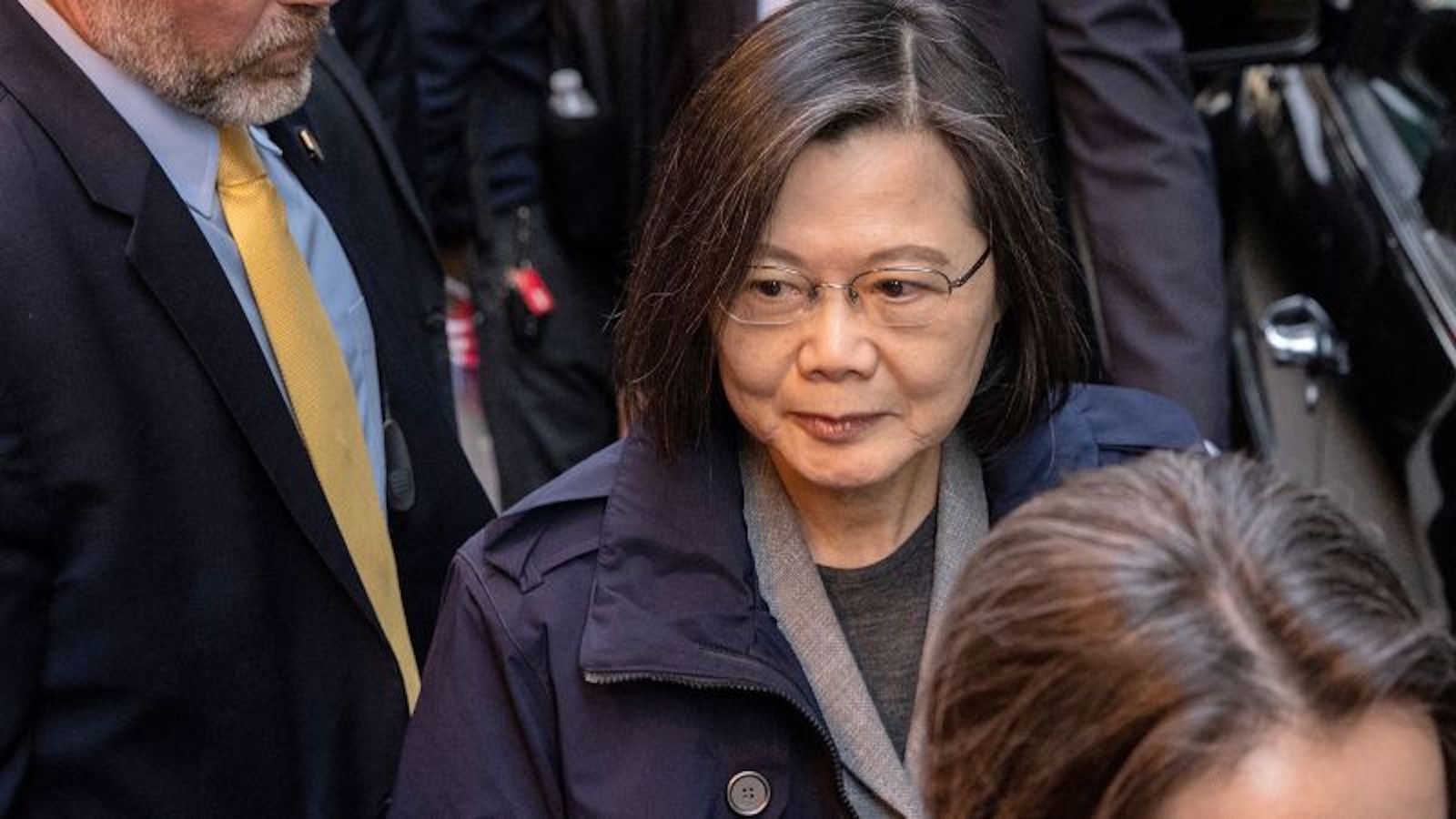(CNN) — Taiwan’s relationship with the United States has “never been closer,” President Tsai Ing-wen said after arriving in New York City on Wednesday, as Beijing warned that her visit could lead to a “serious confrontation” between China and the United States.
Taiwan faces “huge challenges,” Tsai said from the city, the first of two planned stops on both coasts of the United States ahead of an official visit to Central America.
“We know we are strong when we stand in solidarity with other democracies. Taiwan cannot be isolated and we will not take friendship for granted,” Tsai said at a dinner with members of the Taiwanese-American community, according to footage from CNN affiliate Set TV in Taiwan.
Sai’s visit comes at a time of heightened tensions between the US and China and has already drawn sharp condemnation from Beijing, which claims democratic Taiwan as its territory, although it has never controlled it.
Tsai’s entry into the United States could lead to a “serious” confrontation in the U.S.-China relationship and have a “severe impact” on their relations, China’s charge d’affaires Xu Suyuan told reporters in Washington on Wednesday.
“What the US has done undermines China’s sovereignty and territorial integrity,” Xu said, adding that the US should bear “all the consequences”.
Sai’s travels have come under particular scrutiny following reports that he will meet US House Speaker Kevin McCarthy during one of his unofficial stops in the US, which Beijing has vowed to “resolutely fight back” if that happens.
Taiwan did not confirm the meeting or provide details about Sai’s itinerary while in the United States.
Beijing began extensive, days-long military exercises around the island last August following a visit to Taipei by then-Speaker of the US House of Representatives Nancy Pelosi.
Pelosi is the highest-ranking US official to visit Taiwan in 25 years, and the trip has prompted accusations from Beijing that the US is changing the nature of its relationship with Taiwan, which US officials have repeatedly denied.
Supporters gather as Taiwanese President Tsai Ing-wen arrives at the Lotte Hotel in Manhattan on March 29, 2023 in New York City. (Credit: Jeana Moon/Reuters)
Taiwan President Visits America
Tsai said via Facebook on Wednesday that her delegation was welcomed by Laura Rosenberger, president of the American Institute in Taiwan (AIT), the organization that conducts unofficial US relations with Taiwan. Rosenberger and New Jersey Gov. Bill Murphy made the comments Wednesday night at a welcome party for the tilt.
Speaking at the event, Tsai thanked the U.S. government for “honoring its security commitments to Taiwan” and noted congressional support for Taiwan’s defense capabilities and the administration’s arms sales. Biden to Taiwan.
Although it severed its formal diplomatic ties with Taipei in 1979 when it recognized the government in Beijing, the United States is required by law to sell arms to Taiwan for its defense.
Because of America’s unofficial relationship with Taiwan, Tsai’s visit was not classified as an official visit to keep the United States within the long-standing “One China” policy.
Under the “One China” policy, the US accepts China’s position that Taiwan is part of China, but does not officially recognize Beijing’s claim to the island of 23 million people.
US officials have sought to dismiss their stops as unusual and have insisted Beijing does not use it as an excuse to take “aggressive or coercive measures” in Taiwan.
According to US officials, Tsai has traveled to the US six times during her previous presidency.
On Wednesday, National Security Council spokesman John Kirby insisted that such transfers were “private” and “unofficial.”
“The PRC should not use this transit as an excuse to intensify any aggressive actions around the Taiwan Strait. The US and China have differences over Taiwan, but we have managed those differences for more than 40 years,” Kirby said.
However, in the weeks before Sai’s visit, Beijing issued several condemnations and said it would reach out to its American counterparts about reports of a possible meeting with McCarthy, saying such a meeting on American soil might be seen as less provocative than a visit. Top US lawmaker to Taiwan.
Frictions between China and the United States over the future of the democratic island have intensified in recent years.
Beijing has vowed to seize the island by force if necessary, and under Xi Jinping’s leadership it has increased military, diplomatic and economic pressure on the democracy, prompting Taipei’s allies to switch allegiances.
“External Pressure”
Chai’s transit through the United States is part of a broader international tour that will include state visits to Guatemala and Belize, two of Taiwan’s diplomatic allies, before passing through Los Angeles to return to Taiwan on April 7.
In remarks before his departure, Tsai said “external pressure” would not prevent Taiwan from “moving into the international community.”
Guatemala and Belize are among the few countries that maintain diplomatic relations with Taipei.
That number dropped to 13 over the weekend as Honduras formally established diplomatic ties with China and severed ties with Taiwan.
Beijing has no diplomatic relations with countries that recognize Taipei.
Honduran President Xiomara Castro will travel to China “soon” to sign “auspicious agreements,” his foreign ministry said in an undated tweet on Wednesday.
— CNN’s Jennifer Hansler in Washington, Gladys Tsai in Taiwan, Michael Rios in Atlanta and Dhruv DeKekar of INS in Hong Kong contributed to this report.


:quality(85)/cloudfront-us-east-1.images.arcpublishing.com/infobae/BH6NLAQGXJGADFWTENBUV7Z7RQ.jpg)
:quality(85)/cloudfront-us-east-1.images.arcpublishing.com/infobae/3GK63ATFOMFAYNUAQKUL4WUJFM.jpg)

:quality(85)/cloudfront-us-east-1.images.arcpublishing.com/infobae/SJ35ZLSJ5NB4BWVRJPSK74P7AQ.jpg)